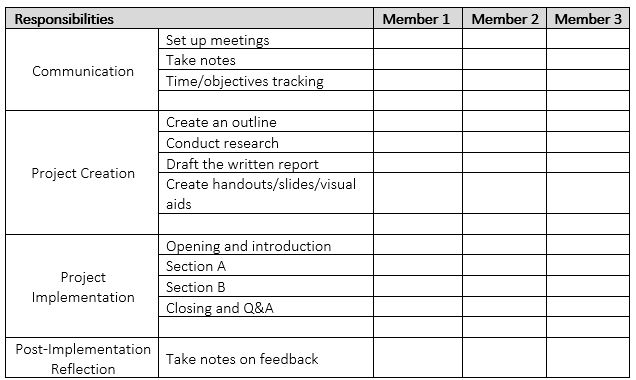Andy Stanfield, director of the Center for Teaching and Learning Excellence at Florida Institute of Technology, is a proponent of using Mayer’s Cognitive Theory of Multimedia Learning to improve instructional design.
Read more ›CURRENT ARTICLE • October 17
OTHER RECENT ARTICLES
Assignments are a terribly important part of the teaching and learning equation. They aren’t just random activities that faculty ask students to complete for points and grades; they are the vehicles through which students learn course content. By studying for exams and engaging with content as they write their papers, students deepen their understanding of key concepts and build learning connections. In short, assignments represent learning experiences for students and, as Dee Fink reminds us, we want those learning experiences to be “significant.” Is that how you’d describe your most often-used assignments? Are they the only ways students could encounter and explore course content? Are they still the best ways?
Read More ›What began as a routine summer workshop on incorporating games and game-like elements into instruction turned into the surprise of the summer; two weeks of fun and intense online game play by an engaged and committed cadre of faculty and staff who were working to apply the principles of gaming to their courses and student activities. I had planned to end the workshop with a two-week follow-up online game for participants, but I didn’t seriously think anyone would do it.
Read More › My colleague, Lolita Paff, has been exploring student attitudes and beliefs about participation. Most of her beginning economics and accounting students describe themselves as “limited” or “non-participants.” They say they don’t participate because they don’t want to look foolish in front of their peers or they learn better by listening. At this point, she has gathered some rather compelling data that grading isn’t motivating her students to participate more. “I had been pretty strongly in the if-you-grade-it-they-will-do-it camp. The evidence surprised me and made me rethink grading participation,” she writes.
My colleague, Lolita Paff, has been exploring student attitudes and beliefs about participation. Most of her beginning economics and accounting students describe themselves as “limited” or “non-participants.” They say they don’t participate because they don’t want to look foolish in front of their peers or they learn better by listening. At this point, she has gathered some rather compelling data that grading isn’t motivating her students to participate more. “I had been pretty strongly in the if-you-grade-it-they-will-do-it camp. The evidence surprised me and made me rethink grading participation,” she writes.
Turnitin Acquires LightSide Labs to Support Formative Feedback on Student Writing
Turnitin, the leaders in originality checking and online grading, today announced the company has reached a definitive agreement to acquire LightSide Labs, an online service that uses machine learning to provide real-time, automated feedback on student writing. The agreement will allow Turnitin to integrate its leading originality checking and online grading features with LightSide Labs’ innovative approach to providing high quality feedback to students across the writing process. Terms of the deal were not disclosed.
Read More › The goal of any well-constructed test is to test students’ expertise on a topic and not their test-taking skills. We need to eliminate as many flaws in our questions as we can to “provide a level playing field for testwise and not-so-testwise students. The probability of answering a question correctly should relate to an examinee's expertise on the topic and should not relate to their expertise on test-taking strategies.” (NMBE, 2001, p 19)
The goal of any well-constructed test is to test students’ expertise on a topic and not their test-taking skills. We need to eliminate as many flaws in our questions as we can to “provide a level playing field for testwise and not-so-testwise students. The probability of answering a question correctly should relate to an examinee's expertise on the topic and should not relate to their expertise on test-taking strategies.” (NMBE, 2001, p 19)
Tests and quizzes are often the primary means of assessing online learner performance; however, as Rena Palloff and Keith Pratt, online instructors and coauthors of numerous online learning books, including Lessons from the Virtual Classroom: The Realities of Online Teaching (2013), point out, there are more effective and less problematic alternatives.
Read More ›There are purists among us who would say that we should never lecture, but I don’t think that’s terribly realistic, and I’m still not ready to totally rule out lectures. As faculty, we bring expertise to learners and having an expert around when you don’t know something can be very helpful. Do most teachers still talk too much? They do. Are lectures fraught with well-established impediments to learning? They are.
Read More ›The idea for sharing this post came from a session I recently conducted at the annual teaching conference organized by my university. A pedagogical conundrum was raised by a colleague whose enthusiasm and question stayed with me and inspired me to write this post. The question posed by this colleague is relevant to all instructors who have ever used group work to assess their students: How should one deal with the issues that arise when members of a group are not picking up their share of the responsibilities during a group work project?
Read More ›Teachers who use group work frequently incorporate some sort of peer assessment activity as a means of encouraging productive interactions within the group. If part of the grade for the group work depends on an assessment by fellow group members, students tend to take their contributions to the group more seriously. Often teachers use some sort of point distribution system where a given number of points must be divided among members, and they cannot be distributed equally. The problem with these systems is that the feedback they provide lacks specificity. Students don’t know what they are doing that accounts for the score they’ve received, and this makes improvement less likely.
Read More ›





